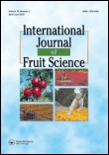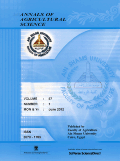
International Journal of Fruit Science
metrics 2024
Cultivating innovation in agronomy and horticulture.
Introduction
International Journal of Fruit Science, published by TAYLOR & FRANCIS INC, is a preeminent platform for the dissemination of high-quality research in the fields of Agronomy, Horticulture, Ecology, and Plant Science. With an impressive track record since its inception in 2005 and ongoing convergence up to 2024, this journal serves as a vital resource for scholars and industry professionals alike. Renowned for its rigorous peer-review process and comprehensive publication of cutting-edge studies, it holds a distinguished position in multiple Scopus rankings, including a top 10 placement in Horticulture (Rank #8/115) and notable percentiles, reflecting its significant impact in the academic community. Researchers can delve into critical insights related to fruit cultivation, genetics, and sustainability, bolstered by its Q1 and Q2 quartile standings across various categories. Though the journal is not open access, it remains an essential read for those intent on advancing knowledge and practices within the rapidly evolving landscape of fruit science.
Metrics 2024
 0.57
0.57 2.40
2.40 2.50
2.50 34
34Metrics History
Rank 2024
Scopus
IF (Web Of Science)
JCI (Web Of Science)
Quartile History
Similar Journals

Pesquisa Agropecuaria Tropical
Connecting research and practice for food security.pesquisa Agropecuaria Tropical is a premier Open Access journal dedicated to advancing the knowledge and practices within the field of agronomy and crop science. Since its inception in 1971, this peer-reviewed journal, published by the Universidade Federal de Goiás, has played a pivotal role in disseminating high-quality research from Brazil and beyond. Operating under an Open Access model, it ensures that scholarly articles are freely accessible, thereby fostering greater collaboration and innovation. With a Scopus ranking placing it in the 32nd percentile among its peers in agricultural and biological sciences, and a current classification in the Q3 category of agronomy and crop science, the journal serves as an essential resource for researchers, professionals, and students alike. As it continues its publication journey from 2010 to 2024, it remains committed to contributing valuable insights and advancements in the agricultural sector, ultimately influencing sustainable practices and food security.

Horticultural Plant Journal
Advancing the Frontiers of Horticultural ScienceThe Horticultural Plant Journal, published by KEAI PUBLISHING LTD, stands at the forefront of horticultural research and innovation. With an ISSN of 2095-9885 and an E-ISSN of 2468-0141, this open access journal has been committed to disseminating significant findings in horticulture since 2015. As of 2023, it proudly holds prestigious Q1 rankings across multiple categories, including Biochemistry, Genetics and Molecular Biology, Ecology, and Plant Science, reflecting its impactful contributions to diverse scientific fields. Located in Beijing, China, the journal not only facilitates groundbreaking studies but also provides crucial insights into sustainability and environmental issues, being ranked in the top tiers of relevant disciplines. This makes it an invaluable resource for researchers, professionals, and students who aim to stay at the cutting edge of horticultural science, offering them the latest research that informs both academic understanding and practical application.

AMERICAN JOURNAL OF POTATO RESEARCH
Fostering Global Research in Potato AgricultureAMERICAN JOURNAL OF POTATO RESEARCH is a prominent scholarly journal dedicated to the field of potato research, encompassing vital areas of Agronomy and Crop Science. Published by SPRINGER, this journal holds an impactful presence in the scientific community, as evidenced by its placement in the Q2 quartile of both Agronomy and Plant Science categories for 2023. With a Scopus rank of #145 out of 406 in Agricultural and Biological Sciences, it offers a significant platform for researchers, professionals, and students alike. Covering diverse topics from cultivation techniques to pest management, the journal aims to advance understanding and innovation in potato science, facilitating the sharing of cutting-edge research and fostering collaboration among scholars. Accessible to a global audience, the journal encourages the dissemination of knowledge through its open-access options. Since its inception in 1998, the AMERICAN JOURNAL OF POTATO RESEARCH has been committed to contributing valuable insights that drive the industry forward and support sustainable agricultural practices.

HORTICULTURAL SCIENCE
Pioneering Sustainable Practices in Horticultural Science.HORTICULTURAL SCIENCE is a premier scholarly journal published by the Czech Academy Agricultural Sciences, focusing on the myriad facets of horticulture, including plant breeding, cultivation techniques, and sustainable practices. With a robust Open Access model established since 2002, it aims to disseminate high-quality research to a global audience, fostering collaboration and innovation within the field. Located in the heart of Prague, Czech Republic, the journal boasts an impressive Q2 ranking in Horticulture as reported in 2023, placing it within the top tier of its discipline. Furthermore, it ranks 52nd out of 115 in the scope of Agricultural and Biological Sciences, reflecting its growing influence and reach in horticultural research. The journal is an essential resource for researchers, professionals, and students alike, aiming to advance knowledge and practices in horticulture through original research articles, reviews, and case studies. With its commitment to academic rigor and relevance, HORTICULTURAL SCIENCE stands as a vital contribution to the ongoing discourse in horticultural studies.

POTATO RESEARCH
Cultivating knowledge, harvesting innovation.POTATO RESEARCH is a prestigious journal dedicated to advancing the scientific understanding of potato cultivation and its wider implications in the fields of agronomy, crop science, and food science. Published by Springer in the Netherlands, this journal boasts an impressive impact factor and ranks in the Q2 category for both Agronomy and Crop Science, as well as Food Science in 2023, affirming its significant contribution to these disciplines. With over five decades of research converged from 1970 to 2024, POTATO RESEARCH serves as a vital platform for researchers, professionals, and students interested in the latest findings and innovations that affect potato production and processing. Although it is not an open-access journal, it remains a crucial resource for those dedicated to enhancing agricultural sustainability and food security. For inquiries or submission details, please refer to their office located at Van Godewijckstraat 30, 3311 GZ Dordrecht, Netherlands.

ANNALS OF AGRICULTURAL SCIENCES
Connecting Research and Practice for Global Agricultural AdvancementANNALS OF AGRICULTURAL SCIENCES, published by Elsevier, stands as a leading open access journal dedicated to the multifaceted field of agricultural sciences. Since its inception in 2011, this journal has served as a pivotal platform for the dissemination of high-quality research, covering areas such as agronomy, animal science, horticulture, food science, plant science, and soil science. With an impressive Q1 ranking across multiple disciplines and notable positions in Scopus Ranks—including #6 in Animal Science and Zoology and #3 in Horticulture—this journal is recognized globally for its significant contribution to advancing agricultural innovations. The journal caters to a diverse audience of researchers, professionals, and students, providing them with open access to cutting-edge studies that address critical issues in agricultural productivity and sustainability. Its commitment to high-impact research ensures that articles contribute meaningfully to the scientific community, fostering advancements in agricultural practices and policies.

Acta Scientiarum Polonorum-Hortorum Cultus
Cultivating Knowledge, Growing Science.Acta Scientiarum Polonorum-Hortorum Cultus is a notable open-access journal dedicated to the field of horticultural science, published by UNIV LIFE SCIENCES LUBLIN in Poland. Since its inception in 2002, it has aimed to disseminate high-quality research findings, innovative methodologies, and advancements in the horticultural sector. The journal is indexed in Scopus and has ranked in the 33rd percentile for Horticulture and the 25th percentile for Plant Science, indicating its growing influence and relevance within the scientific community. Despite the challenges presented in quartile categorizations, Acta Scientiarum Polonorum maintains a commitment to cultivating knowledge and fostering collaboration among researchers, professionals, and students in the agricultural and biological sciences. With its publication timelines spanning from 2008 to 2024, the journal serves as a vital resource for those interested in the latest horticultural trends, sustainable practices, and scientific inquiries that drive the field forward.

Legume Research
Exploring the Vital Role of Legumes in AgricultureLegume Research, published by the AGRICULTURAL RESEARCH COMMUNICATION CENTRE in India, is an essential peer-reviewed journal focusing on advancements in the field of agronomy, crop science, soil science, and plant science. With an ISSN of 0250-5371 and operating since 2008, this journal caters to researchers, agricultural professionals, and students interested in the critical role of legumes in sustainable agriculture and food security. It ranks within the third quartile (Q3) in several prominent categories, reflecting its contribution to the agricultural and biological sciences community—ranking #279 in Agronomy and Crop Science, #113 in Soil Science, and #376 in Plant Science based on Scopus metrics. Although not open access, Legume Research remains a vital resource for those seeking to enhance their knowledge and contribute novel research findings in the ever-evolving discipline of legume cultivation and utilization. With a clear objective to disseminate impactful research, this journal significantly contributes to the global understanding of legumes' ecological, economic, and nutritional importance.

Ornamental Horticulture-Revista Brasileira de Horticultura Ornamental
Elevating Ornamental Horticulture ResearchOrnamental Horticulture - Revista Brasileira de Horticultura Ornamental, published by the SOC BRASILEIRA FLORICULTURA & PLANTAS ORNAMENTAIS, serves as a premier platform for disseminating high-quality research in the field of ornamental horticulture. With an Open Access model in place since 1995, this journal ensures that valuable findings in horticultural science reach a wide audience, fostering greater collaboration within the global community. Based in Brazil, this journal primarily focuses on the cultivation, management, and improvement of ornamental plants, contributing significantly to both the scientific and practical aspects of the horticulture industry. It has achieved esteemed rankings, including being classified in the Q2 quartile for Horticulture and Q3 for Plant Science in 2023, demonstrating its academic rigor and relevance. Scopus ranks it at 54th in Horticulture and 278th in Plant Science, positioning it among leading scholarly resources in these fields. The journal is committed to advancing knowledge through innovative research that aids in the sustainable development of ornamental horticulture practices.

PESQUISA AGROPECUARIA BRASILEIRA
Empowering researchers to tackle global agricultural challenges.PESQUISA AGROPECUARIA BRASILEIRA, an esteemed journal published by EMPRESA BRASIL PESQ AGROPEC, serves as a vital platform for disseminating research in the realms of agronomy, animal science, horticulture, and soil science. With an ISSN of 0100-204X and an e-ISSN of 1678-3921, this Open Access journal has been at the forefront of agricultural research since its initiation in 1978, and has been fully accessible to researchers globally since 1999. Hailing from Brazil, it is dedicated to advancing knowledge in agricultural practices and sustainability, making it an essential resource for academics and professionals alike. The journal is ranked in the Q3 and Q4 quartiles across various categories, reflecting its impact within the scientific community, while its Scopus rankings illustrate its commitment to high-quality scholarship. With its rigorous peer-review process, PESQUISA AGROPECUARIA BRASILEIRA not only promotes scholarly engagement but also plays a crucial role in addressing agricultural challenges, thus appealing to a broad audience of researchers, professionals, and students seeking to contribute to this dynamic field.